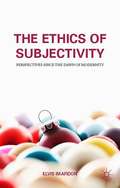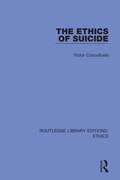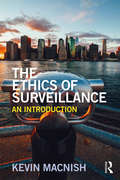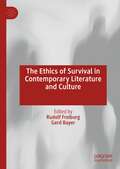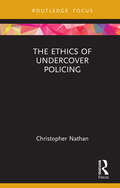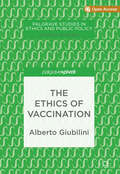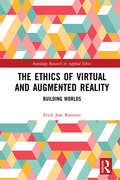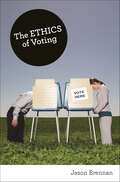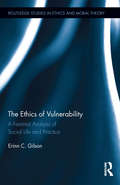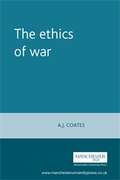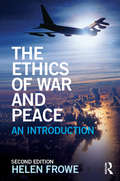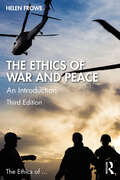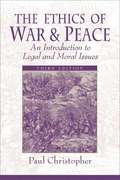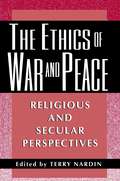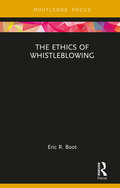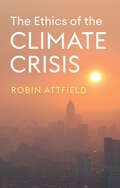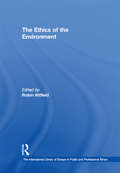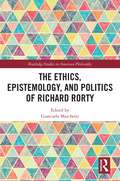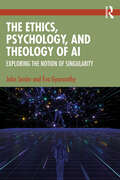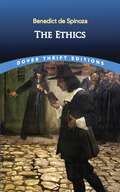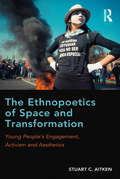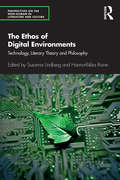- Table View
- List View
The Ethics of Subjectivity
by Elvis ImafidonThe condition into which humans entered since the dawn of modernity altered and led to the disenchantment of traditional (pre-modern) ways of thinking and theorizing in the different spheres of being and discourse mainly due to an emphasis on reason, freedom and the autonomy of the subject. Ethics in particular has continued to experience since modernity a shift from preoccupation with fixated, absolutist systems of ethics such as those built on notions of God and nature to a preoccupationwith the formal, individualistic, fallible or subjective ethical systems that ensue from free and autonomous subjects. The Ethics of Subjectivity presents an examination and analysis of the theorization of this subject-based ethics particularly as presented in the works of key ethicists and philosopher since modernity. These key figures include Kant, Hegel, Bradley, Nietzsche, Foucault, Derrida, Popper, Feyerabend, Habermas, Lacan and Levinas. The volume also examines the implications of the shift to the subject as the focal point of modern ethics for the ever-evolving field of ethics.
The Ethics of Suicide
by Victor CosculluelaOriginally published in 1995, this volume addresses a topical subject: assisted suicide. The book discusses the issues surrounding the morality of suicide and in so doing clarifies the literature in applied ethics. It critiques the complex moral and religious arguments on the topic offered by philosophers and theologians. It establishes a middle position between those who hold that suicide is never morally permissible and those who claim it always is and it determines when second parties ought to aid and when they ought to prevent suicides.
The Ethics of Surveillance: An Introduction (The Ethics of ...)
by Kevin MacnishThe Ethics of Surveillance: An Introduction systematically and comprehensively examines the ethical issues surrounding the concept of surveillance. Addressing important questions such as: Is it ever acceptable to spy on one's allies? To what degree should the state be able to intrude into its citizens' private lives in the name of security? Can corporate espionage ever be justified? What are the ethical issues surrounding big data? How far should a journalist go in pursuing information? Is it reasonable to expect a degree of privacy in public? Is it ever justifiable for a parent to read a child’s diary? Featuring case studies throughout, this textbook provides a philosophical introduction to an incredibly topical issue studied by students within the fields of applied ethics, ethics of technology, privacy, security studies, politics, journalism and human geography.
The Ethics of Survival in Contemporary Literature and Culture
by Gerd Bayer Rudolf FreiburgThe Ethics of Survival in Contemporary Literature and Culture delves into the complex problems involved in all attempts to survive. The essays analyze survival in contemporary prose narratives, short stories, poems, dramas, and theoretical texts, but also in films and other modes of cultural practices. Addressing diverse topics such as memory and forgetting in Holocaust narratives, stories of refugees and asylum seekers, and representations of war, the ethical implications involved in survival in texts and media are brought into a transnational critical discussion. The volume will be of potential interest to a wide range of critics working on ethical issues, the body, and the politics of art and literature.
The Ethics of Undercover Policing (Routledge Focus on Philosophy)
by Christopher NathanDespite the media controversies surrounding high profile cases of undercover policing, it is not always clear what ethical issues are at stake. Can undercover policing be justified? What are the ethical issues surrounding concealment and infiltration? What larger questions does undercover policing raise about the nature of policing and the legitimacy of coercive state action? In this timely and clear account, Christopher Nathan explores these questions and more. He rejects the view that the consequences of undercover policing always justify the means, instead advancing an argument that through their actions people can make themselves morally liable to some forms of undercover policing. Drawing on several recent, high profile case studies, Christopher Nathan argues for a new understanding of proportionality in undercover policing that takes account of innocent parties, vulnerable targets, and manipulation into wrongful action. He also defends a central role for the judiciary in the oversight of undercover policing.
The Ethics of Vaccination (Palgrave Studies in Ethics and Public Policy)
by Alberto GiubiliniThis open access book discusses individual, collective, and institutional responsibilities with regard to vaccination from the perspective of philosophy and public health ethics. It addresses the issue of what it means for a collective to be morally responsible for the realisation of herd immunity and what the implications of collective responsibility are for individual and institutional responsibilities.The first chapter introduces some key concepts in the vaccination debate, such as ‘herd immunity’, ‘public goods’, and ‘vaccine refusal’; and explains why failure to vaccinate raises certain ethical issues. The second chapter analyses, from a philosophical perspective, the relationship between individual, collective, and institutional responsibilities with regard to the realisation of herd immunity. The third chapter is about the principle of least restrictive alternative in public health ethics and its implications for vaccination policies. Finally, the fourth chapter presents an ethical argument for unqualified compulsory vaccination, i.e. for compulsory vaccination that does not allow for any conscientious objection. The book will appeal to philosophers interested in public health ethics and the general public interested in the philosophical underpinning of different arguments about our moral obligations with regard to vaccination.
The Ethics of Virtual and Augmented Reality: Building Worlds (Routledge Research in Applied Ethics)
by Erick Jose RamirezThis book offers new ways of thinking about and assessing the impact of virtual reality on its users. It argues that we must go beyond traditional psychological concepts of VR "presence" to better understand the many varieties of virtual experiences. The author provides compelling evidence that VR simulations are capable of producing "virtually real" experiences in people. He also provides a framework for understanding when and how simulations induce virtually real experiences. From these insights, the book shows that virtually real experiences are responsible for several unaddressed ethical issues in VR research and design. Experimental philosophers, moral psychologists, and institutional review boards must become sensitive to the ethical issues involved between designing "realistic" virtual dilemmas, for good data collection, and avoiding virtually real trauma. Ethicists and game designers must do more to ensure that their simulations don’t inculcate harmful character traits. Virtually real experiences, the author claims, can make virtual relationships meaningful, productive, and conducive to welfare but they can also be used to systematically mislead and manipulate users about the nature of their experiences. The Ethics of Virtual and Augmented Reality will appeal to philosophers working in applied ethics, philosophy of technology, and aesthetics, as well as researchers and students interested in game studies and game design.
The Ethics of Voting
by Jason BrennanNothing is more integral to democracy than voting. Most people believe that every citizen has the civic duty or moral obligation to vote, that any sincere vote is morally acceptable, and that buying, selling, or trading votes is inherently wrong. In this provocative book, Jason Brennan challenges our fundamental assumptions about voting, revealing why it is not a duty for most citizens--in fact, he argues, many people owe it to the rest of us not to vote. Bad choices at the polls can result in unjust laws, needless wars, and calamitous economic policies. Brennan shows why voters have duties to make informed decisions in the voting booth, to base their decisions on sound evidence for what will create the best possible policies, and to promote the common good rather than their own self-interest. They must vote well--or not vote at all. Brennan explains why voting is not necessarily the best way for citizens to exercise their civic duty, and why some citizens need to stay away from the polls to protect the democratic process from their uninformed, irrational, or immoral votes. In a democracy, every citizen has the right to vote. This book reveals why sometimes it's best if they don't. In a new afterword, "How to Vote Well," Brennan provides a practical guidebook for making well-informed, well-reasoned choices at the polls.
The Ethics of Vulnerability: A Feminist Analysis of Social Life and Practice (Routledge Studies in Ethics and Moral Theory)
by Erinn GilsonAs concerns about violence, war, terrorism, sexuality, and embodiment have garnered attention in philosophy, the concept of vulnerability has become a shared reference point in these discussions. As a fundamental part of the human condition, vulnerability has significant ethical import: how one responds to vulnerability matters, whom one conceives as vulnerable and which criteria are used to make such demarcations matters, how one deals with one’s own vulnerability matters, and how one understands the meaning of vulnerability matters. Yet, the meaning of vulnerability is commonly taken for granted and it is assumed that vulnerability is almost exclusively negative, equated with weakness, dependency, powerlessness, deficiency, and passivity. This reductively negative view leads to problematic implications, imperiling ethical responsiveness to vulnerability, and so prevents the concept from possessing the normative value many theorists wish it to have. When vulnerability is regarded as weakness and, concomitantly, invulnerability is prized, attentiveness to one’s own vulnerability and ethical response to vulnerable others remain out of reach goals. Thus, this book critiques the ideal of invulnerability, analyzes the problems that arise from a negative view of vulnerability, and articulates in its stead a non-dualistic concept of vulnerability that can remedy these problems.
The Ethics of War
by A. J. CoatesDrawing on examples from the history of warfare from the crusades to the present day, "The ethics of war" explores the limits and possibilities of the moral regulation of war. While resisting the commonly held view that 'war is hell', A. J. Coates focuses on the tensions which exist between war and morality. The argument is conducted from a just war standpoint, though the moral ambiguity and mixed record of that tradition is acknowledge and the dangers which an exaggerated view of the justice or moral worth of war poses are underlined.
The Ethics of War and Nuclear Deterrence
by James P. SterbaA selection of addresses, essays and lectures on the moral and ethical aspects of war and the strategy of deterrence.
The Ethics of War and Peace: An Introduction (The Ethics of ...)
by Helen FroweThe Ethics of War and Peace is a lively introduction to one of the oldest but still most relevant ethical debates. Focusing on the philosophical questions surrounding the ethics of modern war, Helen Frowe presents contemporary just war theory in a stimulating and accessible way. This 2nd edition includes new material on weapons and technology, and humanitarian intervention, in addition to: theories of self-defence and national defence jus ad bellum, jus in bello and jus post bellum the moral status of combatants the principle of non-combatant immunity and the nature of terrorism and the moral status of terrorists. Each chapter uses examples and concludes with a summary, discussion questions and suggestions for further reading to aid student engagement, learning and revision. The glossary has been expanded to cover the full range of relevant terminology. This is the ideal textbook for students of philosophy and politics approaching this important area for the first time.
The Ethics of War and Peace: An Introduction (The Ethics of ...)
by Helen FroweThe Ethics of War and Peace is a lively introduction to one of the oldest but still most relevant ethical debates. Focusing on the philosophical questions surrounding the ethics of modern war, Helen Frowe presents contemporary just war theory in a stimulating and accessible way. This third edition has been revised and updated throughout, with additional material covering belligerents’ duties to refugees, the scope of jus ad bellum, indirect intervention and alternatives to intervention, and the withdrawal of forces from Afghanistan. The book also covers key topics, including: theories of self-defence and national defence jus ad bellum, jus in bello and jus post bellum the moral status of combatants humanitarian intervention weapons and technology the principle of non-combatant immunity the nature of terrorism and the moral status of terrorists. Each chapter uses examples and concludes with a summary, discussion questions and suggestions for further reading to aid student engagement, learning and revision. A glossary covers the full range of relevant terminology. This is the ideal textbook for students of philosophy and politics approaching this important area for the first time.
The Ethics of War and Peace: An Introduction to Legal and Moral Issues
by Paul ChristopherThe most important decision that nations make is whether to use force for political objectives. In a democracy, all responsible citizens feel the weight of such decisions.
The Ethics of War and Peace: Religious and Secular Perspectives (Ethikon Series in Comparative Ethics)
by Terry NardinA superb introduction to the ethical aspects of war and peace, this collection of tightly integrated essays explores the reasons for waging war and for fighting with restraint as formulated in a diversity of ethical traditions, religious and secular. Beginning with the classic debate between political realism and natural law, this book seeks to expand the conversation by bringing in the voices of Judaism, Islam, Christian pacifism, and contemporary feminism. In so doing, it addresses a set of questions: How do the adherents to each viewpoint understand the ideas of war and peace? What attitudes toward war and peace are reflected in these understandings? What grounds for war, if any, are recognized within each perspective? What constraints apply to the conduct of war? Can these constraints be set aside in situations of extremity? Each contributor responds to this set of questions on behalf of the ethical perspective he or she is presenting. The concluding chapters compare and contrast the perspectives presented without seeking to adjudicate their differences. Because of its inclusive, objective, comparative, and dialogic approach, the book serves as a valuable resource for scholars, journalists, policymakers, and anyone else who wants to acquire a better understanding of the range of moral viewpoints that shape current discussion of war and peace. In addition to the editor, the contributors are Joseph Boyle, Michael G. Cartwright, Jean Bethke Elshtain, John Finnis, Sohail H. Hashmi, Theodore J. Koontz, David R. Mapel, Jeff McMahan, Richard B. Miller, Aviezer Ravitzky, Bassam Tibi, Sarah Tobias, and Michael Walzer.
The Ethics of War and the Force of Law: A Modern Just War Theory (Routledge Research in Applied Ethics)
by Uwe SteinhoffThis book provides a thorough critical overview of the current debate on the ethics of war, as well as a modern just war theory that can give practical action-guidance by recognizing and explaining the moral force of widely accepted law. Traditionalist, Walzerian, and "revisionist" approaches have dominated contemporary debates about the classical jus ad bellum and jus in bello requirements in just war theory. In this book, Uwe Steinhoff corrects widely spread misinterpretations of these competing views and spells out the implications for the ethics of war. His approach is unique in that it complements the usual analysis in terms of self-defense with an emphasis on the importance of other justifications that are often lumped together under the heading of "lesser evil." It also draws on criminal law and legal scholarship, which has been largely ignored by just war theorists. Ultimately, Steinhoff rejects arguments in favor of "moral fundamentalism"— the view that the laws and customs of war must simply follow an immutable morality. In contrast, he argues that widely accepted laws and conventions of war are partly constitutive of the moral rules that apply in a conflict. The Ethics of War and the Force of Law will be of interest to scholars and advanced students working in just war theory, applied ethics, political philosophy, political theory, philosophy of law, and criminal and military law.
The Ethics of Whistleblowing (Routledge Focus on Philosophy)
by Eric R. BootFollowing the enormous political, legal, and media interest that has surrounded high profile cases of whistleblowing, such as Chelsea Manning and Edward Snowden, the fundamental ethical questions surrounding whistleblowing have often been obscured. In this fascinating book Eric Boot examines the ethical issues at stake in whistleblowing. Can the disclosure of classified government documents ever be justified? If so, how? Why does it require justification in the first place? Can there ever be a duty to blow the whistle? When is breaking the law justified? On a more practical level, this book also considers the various whistleblower protection documents and finds them often lacking in consistency and clarity, before providing an argument for a plausible "public interest" defense for whistleblowers.
The Ethics of Wilfrid Sellars (Routledge Studies in American Philosophy)
by Jeremy Randel KoonsWilfrid Sellars’s ethical theory was rich and deeply innovative. On Sellars’s view, moral judgments express a special kind of shared intention. Thus, we should see Sellars as an early advocate of an expressivism of plans and intentions, and an early theorist of collective intentionality. He supplemented this theory with a sophisticated logic of intentions, a robust theory of the categorical validity of normative expressions, a subtle way of reconciling the cognitive and motivating aspects of moral judgment, and much more—all within a strict nominalism that preserves Sellars’s commitment to naturalism. The Ethics of Wilfrid Sellars offers the first systematic treatment of this sadly-neglected aspect of Sellars’s work, and demonstrates that his ethical theory—just like his more widely-discussed epistemology—has much to contribute to current debates.
The Ethics of the Climate Crisis
by Robin AttfieldThe planet is in crisis. Time is short, but it is still possible to mitigate greenhouse gas emissions before disaster overtakes us all. Renowned philosopher Robin Attfield explains the moral reasons for urgent action based on current harms, threats to future generations, and to the species with which we share the planet. In compelling and student-friendly prose, he explores the science of climate change, biodiversity loss and air pollution, climate injustices, political implications of the crisis, and possible responses. Among other things, he argues that measures to introduce climate justice should be paid for by countries able to pay, and by the big polluters in particular. The recently agreed Loss and Damage fund can play a central part in climate funding. Related political measures, such as the introduction of Ecocide as an international crime alongside war crimes, also give cause for hope. Attfield’s passionately argued twentieth book, The Ethics of the Climate Crisis, is crucial reading for our times.
The Ethics of the Environment (The International Library of Essays in Public and Professional Ethics)
by Robin AttfieldThis book brings together over thirty of the foremost contributions to environmental ethics, from pioneering papers to recent work at the cutting edge of thought in this field. It also unites them through an innovative introductory essay which appraises both strengths and weaknesses and presents a distinctive view of the subject. Areas covered include the land ethic, Deep Ecology, biocentric approaches, environmental virtue ethics, feminist contributions, debates on equity and on the interests and representation of future generations, preservation, sustainability and sustainable development. The importance of attempts to discover a comprehensive ethic relevant both to the environment and other key areas of ethical debate is highlighted. Robin Attfield has been working in this field for thirty years, and has published several related collections and monographs, of which the latest is Environmental Ethics: An Overview for the Twenty-First Century, published by Polity in 2003. The Ethics of The Environment complements that work, from which it incorporates a significant extract about the considerable practical difference that environmental ethics is capable of making.
The Ethics, Epistemology, and Politics of Richard Rorty (Routledge Studies in American Philosophy)
by Giancarlo MarchettiThis book features fourteen original essays that critically engage the philosophy of Richard Rorty, with an emphasis on his ethics, epistemology, and politics. Inspired by James’ and Dewey’s pragmatism, Rorty urged us to rethink the role of science and truth with a liberal-democratic vision of politics. In doing so, he criticized philosophy as a sheer scholastic endeavor and put it back in touch with our most pressing cultural and human needs. The essays in this volume employ the conceptual tools and argumentative techniques of analytic philosophy and pragmatism and demonstrate the relevance of Rorty’s thought to the most urgent questions of our time. They touch on a number of topics, including but not limited to structural injustice, rule-following, Black feminist philosophy, legal pragmatism, moral progress, relativism, and skepticism. This book will be of interest to a wide range of scholars across disciplines who are engaging with the work of Richard Rorty.
The Ethics, Psychology, and Theology of AI: Exploring the Notion of Singularity
by John Senior Éva GyarmathyThis book explores the profound impact of artificial intelligence psychology (AIPsy) on human psychology, identity, theology, and agency, addressing the urgent need to define the future of humanity amidst evolving technological landscapes.The book challenges traditional notions of human uniqueness and agency, contemplating the transformative potential of a technological singularity where AI may surpass human intelligence, rendering civilization obsolete. Divided into four sections, it covers the psychological implications of AI on human cognition and behaviour, analyzes theological perspectives on AI, re-examines agency and identity in the age of AI, and fosters a multidisciplinary dialogue synthesizing insights from psychology, theology, ethics, philosophy, computer science, and sociology. Key chapters explore human-AI interaction, trust in AI, and the emerging field of artificial intelligent machine psychology (AIPsy), alongside theological dilemmas, divine intelligence, moral responsibility, and the legal rights of creative intelligent machines.Positioned as a critical resource for scholars, researchers, theologians, ethicists, psychologists, and policymakers, the book aims to deepen our understanding of the complex relationship between humanity and AI, guiding informed decisions and ethical considerations in the transformative era of AI.
The Ethics: (ethica Ordine Geometrico Demonstrata) (Dover Thrift Editions)
by Benedict De SpinozaEthics is a philosophical book written by Benedictus de Spinoza. Although published after Spinoza's death, in 1677, it is considered his greatest and most famous work. In it, Spinoza tries to set out a "fully cohesive philosophical system that strives to provide a coherent picture of reality and to comprehend the meaning of an ethical life. Following a logical step-by-step format, it defines in turn the nature of God, the mind, human bondage to the emotions, and the power of understanding
The Ethnopoetics of Space and Transformation: Young People’s Engagement, Activism and Aesthetics
by Stuart C. AitkenChange is inevitable, we are told. A job is lost, a couple falls in love, children leave home, an addict joins Narcotics Anonymous, two nations go to war, a family member's health deteriorates, a baby is born, a universal health care bill is voted into law. Life comprises events over which we have considerable, partial, or little or no control. The distance between the event and our daily lives suggests a quirky spatial politics. Our lives move forward depending upon how events play out in concert with our reactions to them. Drawing on nearly three decades of geographic projects that involve ethnographies and interviews with, and stories about, young people in North and South American, Europe and Asia and using the innovative technique of ethnopoetry, Aitken examines key life-changing events to look at the interconnections between space, politics, change and emotions. Analysing the intricate spatial complexities of these events, he explores the emotions that undergird the ways change takes place, and the perplexing spatial politics that almost always accompany transformations. Aitken positions young people as effective agents of change without romanticizing their political involvement as fantasy and unrealistic dreaming. Going further, he suggests that it is the emotional palpability of youth engagement and activism that makes it so potent and productive. Pulling on the spatial theories of de Certeau, Deleuze, Massey, Agamben, Rancière, Zizek and Grosz amongst others, Aitken argues that spaces are transformative to the degree that they open the political and he highlights the complexly interwoven political, economic, social and cultural practices that simultaneously embed and embolden people in places. If we think of spaces as events and events encourage change, then spaces and people become other through complex relations. Taking poetry to be an emotive construction of language, Aitken re-visualizes, contorts and arranges people's words and gestures to
The Ethos of Digital Environments: Technology, Literary Theory and Philosophy (Perspectives on the Non-Human in Literature and Culture)
by Susanna LindbergWhile self-driving cars and autonomous weapon systems have received a great deal of attention in media and research, the general requirements of ethical life in today’s digitalizing reality have not been made sufficiently visible and evaluable. This collection of articles from both distinguished and emerging authors working at the intersections of philosophy, literary theory, media, and technology does not intend to fix new moral rules. Instead, the volume explores the ethos of digital environments, asking how we can orient ourselves in them and inviting us to renewed moral reflection in the face of dilemmas they entail. The authors show how contemporary digital technologies model our perception, narration as well as our conceptions of truth, and investigate the ethical, moral, and juridical consequences of making public and societal infrastructures computational. They argue that we must make the structures of the digital environments visible and learn to care for them.
